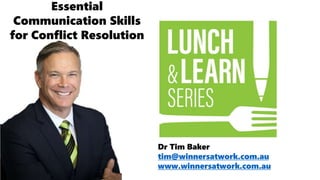
Essential Communication Skills Conflict Resolution
- 1. Dr Tim Baker tim@winnersatwork.com.au www.winnersatwork.com.au Essential Communication Skills for Conflict Resolution
- 2. Unit 1—The Five Approaches to Dealing with Conflict Unit 2—Understanding People & their Personalities Unit 3—Managing Emotion in Conflict Situations Unit 4—Being Assertive, Not Aggressive or Passive Unit 5—Essential Communication Skills for Conflict Resolution Unit 6—Giving & Receiving Constructive Criticism
- 4. SBI Model •Situation •Behaviour •Impact In this morning’s meeting (Situation), when you raised that issue about following up on the project we’ve just completed (Behaviour), you refocused our attention on something that was important to the team’s performance (Impact). Yesterday in the meeting (Situation), when you raised your voice at me in the meeting when I disagreed with you (behaviour), I felt disrespected and embarrassed (Impact).
- 5. Restating the other person’s comment in your own words.
- 6. Why Paraphrase … • To check that you have understood • To let your manager know that you understand • To take control of the conversation
- 7. Paraphrasing In other words … Check you understand 1 Show that you do understand 2 Take control off the conversation 3
- 8. Reflection or Paraphrasing • Paraphrasing: Repeating what you have just heard in your own words – Without parroting. “So the insurance companies aren’t going to accept your claim because the accident happened on your way home from work” • Reflecting feelings: Focus on feeling words - “If I were having that experience, what would I be feeling?” • Summative reflections: Restatement of the main themes and feelings “It sounds like the hail damage to your car during exam week has made you feel stressed and upset”
- 9. Listening • Listening is the process of taking in what we hear and mentally organising it to make sense of the information. • Listening techniques also assist us to decode non-verbal communication. • Non-verbal communication is not always easy to decode!
- 10. Listening • People spend between 70 and 80% of their day engaged in some form of communication, and about 55% of their time is devoted to listening. • The average number of words you're able to listen to per minute is around 450. But we speak at 125- 175 wpm • You might be surprised to learn that your words only convey about 7% of what you're trying to say. The other 93% is communicated through facial expressions and the tone of your voice. • Five types of listening: 1. Pseudo listening 2. Appreciative listening 3. Empathetic listening 4. Comprehensive listening 5. Critical listening
- 11. The Process of Listening HURIER LISTENING MODEL • Hearing - The physiology of hearing and attention • Understanding - Personal filters • Remembering - Short term and long-term memory • Interpreting – Decoding nonverbal behavior • Evaluating - Understanding principles of persuasion and critical thinking to evaluate the validity of a message. • Responding - Choosing an appropriate response from among the alternatives (assertive and supportive responses, feedback and active listening skills)
- 12. Skill Set A good listener can: • Be patient • Ask the right questions • Recognise, separate and evaluate fact from inference • Think critically • Recognise patterns • Group like material • Reflect • Paraphrase • Demonstrate positive regard and empathy
- 13. Attending Skills Attending skills are culturally sensitive - To understand what is appropriate ask questions of one another. Regardless of culture, attending skills involve: A posture of Involvement - In western culture this involves leaning forward, arms and legs unfolded, no barriers, face the person, keep an appropriate distance Appropriate body motion Appropriate eye contact Non-distracting environment
- 14. Your homework Practise some of these skills and reflect on how successful they have been.
- 15. Unit 1—The Five Approaches to Dealing with Conflict Unit 2—Understanding People & their Personalities Unit 3—Managing Emotion in Conflict Situations Unit 4—Being Assertive, Not Aggressive or Passive Unit 5—Essential Communication Skills for Conflict Resolution Unit 6—Giving & Receiving Constructive Criticism
